1 of 10
Download to read offline
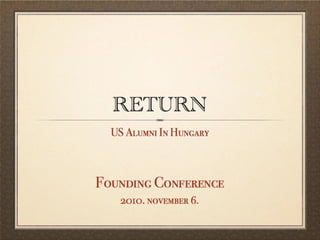

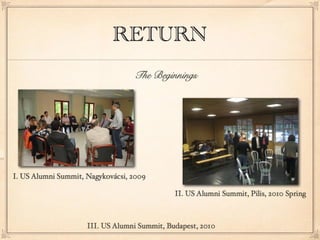
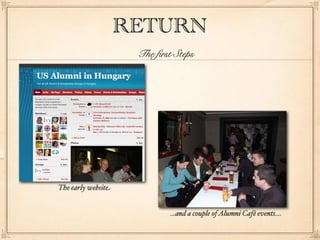

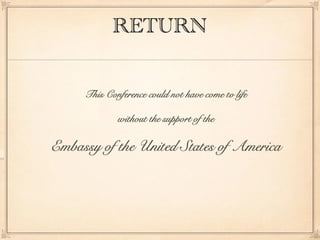
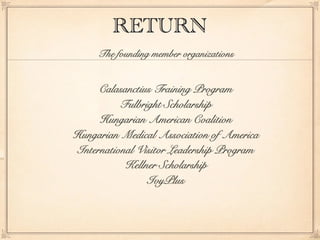
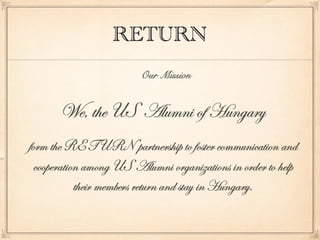


Ad
Recommended
Back to High School - IvyPlus Project
Back to High School - IvyPlus ProjectRETURN - US Alumni in Hungary
Ã˝
IvyPlusers promote education in the U.S. by visiting the Hungarian High Schools they graduated from.Common Sense Society Hungary - Introduction
Common Sense Society Hungary - IntroductionRETURN - US Alumni in Hungary
Ã˝
Hungary's 'Constitution of Liberty' initiative aims to elevate discourse around human freedom and engage various stakeholders, including decision-makers and the general public, particularly youth. The project includes metrics for measuring impact, such as webpage hits and media mentions, and facilitates ongoing discussion through a dedicated website. Additionally, it focuses on constitutional amendments and national sovereignty issues.IvyPlus Introduction
IvyPlus IntroductionRETURN - US Alumni in Hungary
Ã˝
Communication and social platform for residents and citizens of Hungary who are alumni of Ivy League Universities and other top schools of the US or rest of the World. IvyPlus holds 4 social meetings a year plus
periodic formal events.Kellner Alumni - Introduction
Kellner Alumni - IntroductionRETURN - US Alumni in Hungary
Ã˝
The document provides information about the Kellner Alumni Association and highlights events such as the return conference held at the Ybl Palace on November 6, 2010. It also mentions Paul Kellner and features contact information for the association. Additionally, it references a project on housing as a fundamental human right.Eisenhower Fellowship
Eisenhower FellowshipRETURN - US Alumni in Hungary
Ã˝
The document summarizes the history and impact of the Eisenhower Fellowships program, which since 1953 has brought emerging leaders from over 49 countries to the United States for intensive professional programs. Over five decades, some 1,700 fellows have participated, with Hungarian fellows participating since the 1940s across topics like procurement, trade, education, and sustainability. The fellowship aims to maintain an active global alumni network, and organized its first Eisenhower Day of Fellowship event in Budapest in 2010 to renew the fellowship experience and commemorate the program's founding.–ö–æ–º–ø—å—é—Ç–µ—Ä–Ω—ã–µ –∫—É—Ä—Å—ã –¥–ª—è –ø–æ–∂–∏–ª—ã—Ö –ª—é–¥–µ–π. –ó–∞–Ω—è—Ç–∏—è 1 4
–ö–æ–º–ø—å—é—Ç–µ—Ä–Ω—ã–µ –∫—É—Ä—Å—ã –¥–ª—è –ø–æ–∂–∏–ª—ã—Ö –ª—é–¥–µ–π. –ó–∞–Ω—è—Ç–∏—è 1 4Ilya Novikov
Ã˝
–î–æ–∫—É–º–µ–Ω—Ç –ø—Ä–µ–¥—Å—Ç–∞–≤–ª—è–µ—Ç —Å–æ–±–æ–π –ø—Ä–æ–≥—Ä–∞–º–º—É –æ–±—É—á–µ–Ω–∏—è –æ—Å–Ω–æ–≤–∞–º –∫–æ–º–ø—å—é—Ç–µ—Ä–Ω–æ–π –≥—Ä–∞–º–æ—Ç–Ω–æ—Å—Ç–∏, –æ—Ö–≤–∞—Ç—ã–≤–∞—é—â—É—é —Ç–∞–∫–∏–µ —Ç–µ–º—ã, –∫–∞–∫ —É—Å—Ç—Ä–æ–π—Å—Ç–≤–æ –∫–æ–º–ø—å—é—Ç–µ—Ä–∞, —Ä–∞–±–æ—Ç–∞ —Å —Ñ–∞–π–ª–∞–º–∏ –∏ –ø–∞–ø–∫–∞–º–∏, –∏—Å–ø–æ–ª—å–∑–æ–≤–∞–Ω–∏–µ –∏–Ω—Ç–µ—Ä–Ω–µ—Ç–∞ –∏ —ç–ª–µ–∫—Ç—Ä–æ–Ω–Ω—ã—Ö –ø–æ—á—Ç–æ–≤—ã—Ö —Å–∏—Å—Ç–µ–º, –∞ —Ç–∞–∫–∂–µ –æ—Å–Ω–æ–≤—ã —Ä–∞–±–æ—Ç—ã —Å —Ç–µ–∫—Å—Ç–æ–º –∏ –æ—Ñ–∏—Å–Ω—ã–º–∏ –ø—Ä–∏–ª–æ–∂–µ–Ω–∏—è–º–∏. –í —Ö–æ–¥–µ –∫—É—Ä—Å–∞ —Ä–∞—Å—Å–º–∞—Ç—Ä–∏–≤–∞—é—Ç—Å—è –ø—Ä–∞–∫—Ç–∏—á–µ—Å–∫–∏–µ –Ω–∞–≤—ã–∫–∏, —Ç–∞–∫–∏–µ –∫–∞–∫ —Å–æ–∑–¥–∞–Ω–∏–µ –∏ —É–ø—Ä–∞–≤–ª–µ–Ω–∏–µ –¥–æ–∫—É–º–µ–Ω—Ç–∞–º–∏, –±–µ–∑–æ–ø–∞—Å–Ω–æ—Å—Ç—å –≤ —Å–µ—Ç–∏ –∏ —Ä–∞–±–æ—Ç–∞ —Å –ø—Ä–æ–≥—Ä–∞–º–º–∞–º–∏. –ö–∞–∂–¥—ã–π –º–æ–¥—É–ª—å —Å–æ–¥–µ—Ä–∂–∏—Ç –ø–ª–∞–Ω –∑–∞–Ω—è—Ç–∏—è, –∫–ª—é—á–µ–≤—ã–µ —Ç–µ–º—ã –∏ –º–µ—Ç–æ–¥—ã –æ–±—É—á–µ–Ω–∏—è.Calasanctius Training Program - Introduction
Calasanctius Training Program - IntroductionRETURN - US Alumni in Hungary
Ã˝
The Calasanctius Training Program, presented by Dr. Peter Forgach, aims to provide scholarships for U.S. master's degrees and support youth business initiatives. It emphasizes the importance of volunteerism and civic duty while addressing challenges in organizing study opportunities. The program seeks to foster alumni networks and promote fundraising efforts.Hungarian american coalition
Hungarian american coalitionRETURN - US Alumni in Hungary
Ã˝
The document summarizes information about the Hungarian American Coalition's Congressional Internship Program. It states that the program was established to allow young Hungarian Americans and Hungarians to gain experience working in the US Congress and motivate them for public service. Interns work in congressional offices and organizations in Washington D.C. that are involved in US-Hungarian relations and policy. The program aims to build professional contacts for interns. It also maintains an active alumni community that helps identify new interns and provides networking support.Youth Business Program - CTP
Youth Business Program - CTPRETURN - US Alumni in Hungary
Ã˝
The Youth Business Program, initiated by László Balogh and supported by CTP alumni, aims to foster entrepreneurial spirit among high school students since 2000. It includes workshops, lectures, and summer programs in multiple locations across Hungary, Romania, Ukraine, and Slovakia, along with cooperation in the U.S. Over ten years, it has engaged 650 students through 29 programs, providing valuable business education and promoting community service.Meet The Scientists - Fulbright
Meet The Scientists - FulbrightRETURN - US Alumni in Hungary
Ã˝
The document outlines a program enhancing science and technology education in Hungary by connecting high school students with cutting-edge scientists for practical experiences. Launched on 'first Fulbright day' by US Ambassador Eleni Tsakopoulos Kounalakis, the initiative aims to promote science through video sessions and engaging activities across multiple locations. Future expansion is planned based on the insights gained from the first year, alongside related events like innovation contests and the Intel International Science and Engineering Fair.Hmaa No Smoking From A To Z11 01
Hmaa No Smoking From A To Z11 01RETURN - US Alumni in Hungary
Ã˝
The HMAA's anti-tobacco campaign in Hungary, initiated in 2008, includes conferences, advocacy for stronger indoor smoking laws, and educational efforts targeting students about the dangers of smoking. Key activities involve collaborations with health officials and internationally recognized anti-tobacco leaders, revealing significant indoor air pollution linked to smoking in public spaces. The campaign aims to decrease smoking among medical professionals, enhance public health, and increase awareness of tobacco's harmful effects, particularly during pregnancy and childhood.Hungarian American Enterprise Fund - Introduction
Hungarian American Enterprise Fund - IntroductionRETURN - US Alumni in Hungary
Ã˝
The document discusses the HAESF organization, which traces back to 1989 and was funded by the US Congress. It aims to promote free enterprise, business development, and human capital investment in Hungary by providing training programs in the US, with the goals of strengthening US-Hungary ties and fostering positive attitudes towards the US in Central Europe. The programs discussed are professional internships, graduate scholarships, senior fellowships, and executive education.Fulbright - Introduction
Fulbright - IntroductionRETURN - US Alumni in Hungary
Ã˝
The document summarizes information about the Fulbright Program in Hungary. It discusses that the Fulbright Program was founded in 1946 and is the world's largest educational exchange program, involving over 150 countries. The Fulbright Program in Hungary began in 1992 and annually supports around 30-35 American citizens and 30-35 Hungarian citizens with grants for opportunities like graduate study, research, teaching, and fellowships. The application process for Hungarians involves an initial screening period followed by peer review, interviews, and final selection by the Fulbright Board in Washington D.C.More Related Content
More from RETURN - US Alumni in Hungary (8)
Hungarian american coalition
Hungarian american coalitionRETURN - US Alumni in Hungary
Ã˝
The document summarizes information about the Hungarian American Coalition's Congressional Internship Program. It states that the program was established to allow young Hungarian Americans and Hungarians to gain experience working in the US Congress and motivate them for public service. Interns work in congressional offices and organizations in Washington D.C. that are involved in US-Hungarian relations and policy. The program aims to build professional contacts for interns. It also maintains an active alumni community that helps identify new interns and provides networking support.Youth Business Program - CTP
Youth Business Program - CTPRETURN - US Alumni in Hungary
Ã˝
The Youth Business Program, initiated by László Balogh and supported by CTP alumni, aims to foster entrepreneurial spirit among high school students since 2000. It includes workshops, lectures, and summer programs in multiple locations across Hungary, Romania, Ukraine, and Slovakia, along with cooperation in the U.S. Over ten years, it has engaged 650 students through 29 programs, providing valuable business education and promoting community service.Meet The Scientists - Fulbright
Meet The Scientists - FulbrightRETURN - US Alumni in Hungary
Ã˝
The document outlines a program enhancing science and technology education in Hungary by connecting high school students with cutting-edge scientists for practical experiences. Launched on 'first Fulbright day' by US Ambassador Eleni Tsakopoulos Kounalakis, the initiative aims to promote science through video sessions and engaging activities across multiple locations. Future expansion is planned based on the insights gained from the first year, alongside related events like innovation contests and the Intel International Science and Engineering Fair.Hmaa No Smoking From A To Z11 01
Hmaa No Smoking From A To Z11 01RETURN - US Alumni in Hungary
Ã˝
The HMAA's anti-tobacco campaign in Hungary, initiated in 2008, includes conferences, advocacy for stronger indoor smoking laws, and educational efforts targeting students about the dangers of smoking. Key activities involve collaborations with health officials and internationally recognized anti-tobacco leaders, revealing significant indoor air pollution linked to smoking in public spaces. The campaign aims to decrease smoking among medical professionals, enhance public health, and increase awareness of tobacco's harmful effects, particularly during pregnancy and childhood.Hungarian American Enterprise Fund - Introduction
Hungarian American Enterprise Fund - IntroductionRETURN - US Alumni in Hungary
Ã˝
The document discusses the HAESF organization, which traces back to 1989 and was funded by the US Congress. It aims to promote free enterprise, business development, and human capital investment in Hungary by providing training programs in the US, with the goals of strengthening US-Hungary ties and fostering positive attitudes towards the US in Central Europe. The programs discussed are professional internships, graduate scholarships, senior fellowships, and executive education.Fulbright - Introduction
Fulbright - IntroductionRETURN - US Alumni in Hungary
Ã˝
The document summarizes information about the Fulbright Program in Hungary. It discusses that the Fulbright Program was founded in 1946 and is the world's largest educational exchange program, involving over 150 countries. The Fulbright Program in Hungary began in 1992 and annually supports around 30-35 American citizens and 30-35 Hungarian citizens with grants for opportunities like graduate study, research, teaching, and fellowships. The application process for Hungarians involves an initial screening period followed by peer review, interviews, and final selection by the Fulbright Board in Washington D.C.